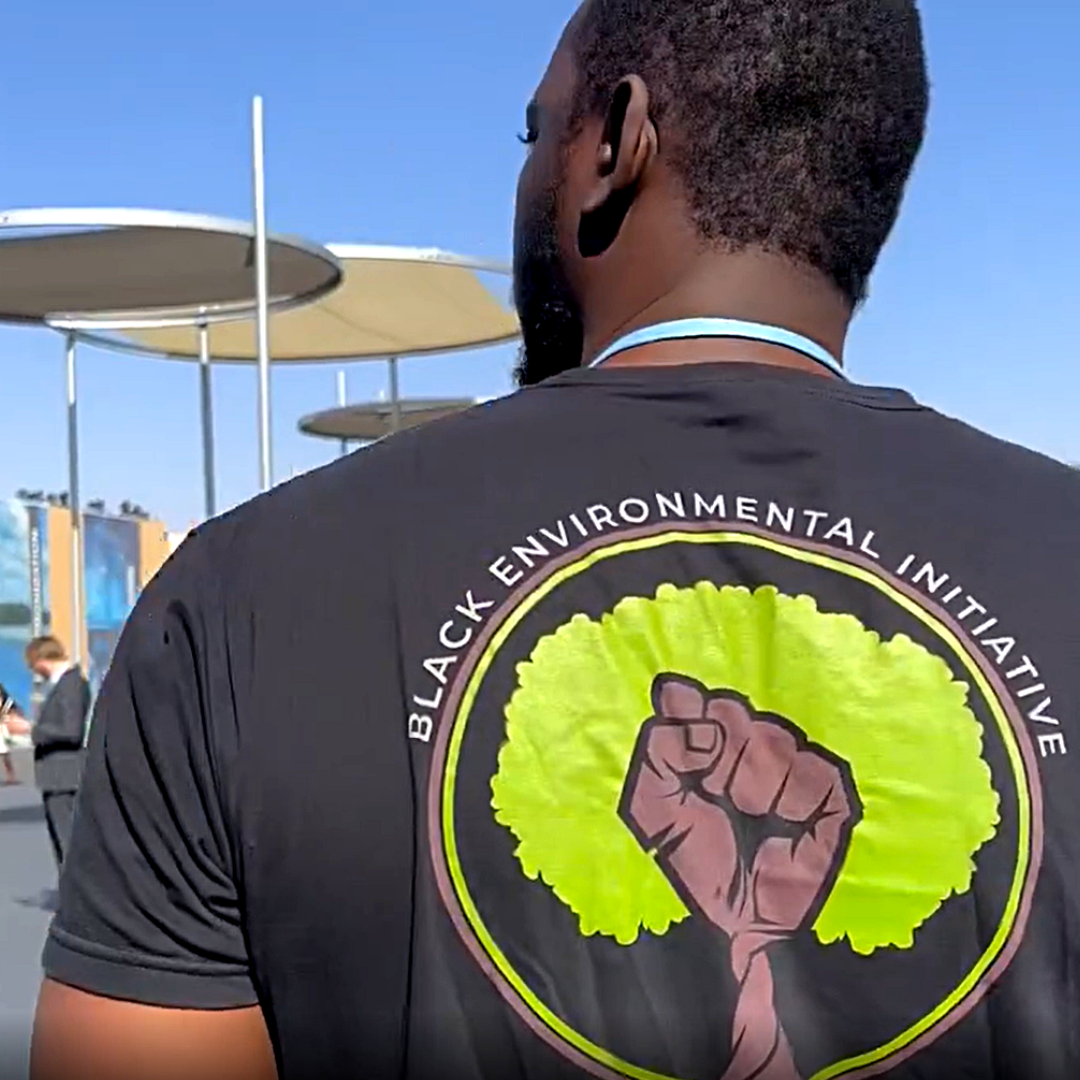From environmental racism to climate justice to colonialism, Black leaders are standing up to address key environmental and social justice issues in Canada every day. This list highlights just a few of the many organizations that should be supported and celebrated this Black History/Futures Month and beyond.
The Black Environmental Initiative (BE Initiative)
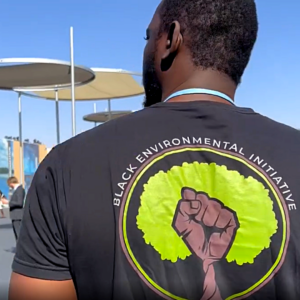
The Black Environmental Initiative was started in 2019, and is currently part of MakeWay’s Shared Platform. This environmental communication initiative engages Black, racialized, low-income and other marginalized communities in environmental action. The project works to raise awareness about how environmental issues impact Black communities and increase access to green jobs, green entrepreneurship opportunities, and environmental protection for Black communities. They also advocate for more diversity in the environmental sector and promote policy change to address all forms of environmental racism.
In Fall of 2022, BE Initiative brought these objectives with them as they attended COP27 (United Nations Climate Change Conference) in Sharm El Sheikh, Egypt and shared some of their reflections with their online community. “Going to COP27, we got the chance to witness Developing countries seek financial assistance for loss and damage – money needed to rescue and rebuild the physical and social infrastructure of countries devastated by extreme weather – for nearly three decades,” they wrote.
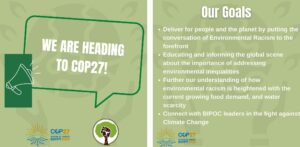
BE Initiative currently runs a collaborative project with the Canadian Meteorological and Oceanography Society (CMOS), an organization that has been funded by Environment and Climate Change Canada to investigate the reasons behind the underrepresentation of Black and Indigenous professionals in the water, weather and climate science sectors. As part of this work, the collective invites BIPOC professionals in meteorology to complete this survey and BIPOC youth to answer this questionnaire.
They run a partnership with the Toronto Community Benefits Network and provide green construction training and opportunities to low-income Black job seekers who can benefit from careers in trades.
BE Initiative also played a key role in creating career opportunities for several Black youth in the environmental and social sectors and will continue to do so.
How can I support? Donate to BE Initiative’s work and follow them on Twitter, Instagram, and Linkedin. If you’re interested in volunteering for or partnering with the project, you can contact them here!
Black Eco Bloom (BEB)
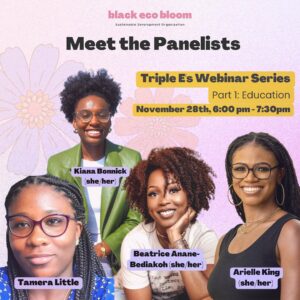
Black Eco Bloom’s mission is to support the growth of Black women, gender diverse people, and non-binary people throughout their journeys in the environmental sector in Canada and abroad. Co-founded by Leila Cantave & Tyjana Connolly, BEB is the youngest organization on this list. They launched in early 2022, but in that short time they’ve been able to grow an amazing team of 10 volunteers, host educational workshops and roundtables, attend COP27, and facilitate 3 different programs.
Their team uses social media to connect and provide education and awareness to their community. Their Instagram series, Climate Crisis from the Black Perspective, clearly and accessibly breaks down social/racial/environmental topics such as the effects of climate change and colonialism on migrant agro-workers or the intersections of mental health and environmental racism. They also use their platform to highlight the work of Black climate activists, Black-owned Eco-businesses, books, resources and more.
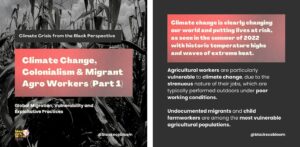
How can I support? Donate! As a volunteer based organization, your funds would go towards supporting their current mission-centered initiatives and creating more equitable futures in climate change action, globally. You can follow them on Instagram, Twitter, Linkedin and TikTok. And if you wish to volunteer with Black Eco Bloom: they have several roles open in administration, content creation, communications and more. Learn more through this link.
CommUNITY Doulas
CommUNITY Doulas’ works to bring longer-term community care support to new and pregnant parents. The project is part of MakeWay’s Shared Platform, and aims to increase and provide doula education, support, and services for marginalized communities, and specifically Black families.
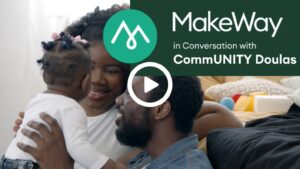 “I feel like the purpose of this work is really to recreate the village, to re-establish networks, and to create systems of support [for Black parents],” said Project Director, Jordyn Gibson, “That’s the community piece: bringing the village to the modern environment. Birth is really at the intersection of all the experiences of Black people, and the struggles we face.”
“I feel like the purpose of this work is really to recreate the village, to re-establish networks, and to create systems of support [for Black parents],” said Project Director, Jordyn Gibson, “That’s the community piece: bringing the village to the modern environment. Birth is really at the intersection of all the experiences of Black people, and the struggles we face.”
Jordyn was recently selected as part of the 2022 Leading Social Justice Fellowship cohort with University of Toronto, which includes leaders from across sectors in the Greater Toronto Area who are working on social justice issues. She will be part of a research team working to collect race-based data regarding Black maternal health outcomes and birthing experiences.
MakeWay was excited to connect with CommUNITY Doulas earlier this year and find out more about how the project came to be. You can watch the full video here!
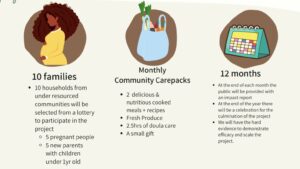
How can I support? CommUNITY Doulas is running a GoFundMe to launch the first cohort of their program: The Pregnancy Project. The initiative aims to bring doulas (pregnancy & postpartum, health & wellness support workers) to 10 Black families for 12 months. Support will help the project capture the experiences of Black families navigating pregnancy & parenting in Ontario, provide monthly fresh produce & curated care packages to new parents, and facilitate workshops to connect and deepen social & spiritual networks that support the parenting journey. You can also follow them on Instagram<
Environmental Noxiousness, Racial Inequities and Community Health Project (The ENRICH Project)
Established in 2012 by Dr. Ingrid Waldron (PhD), the ENRICH Project investigates the cause and effects of toxic industries situated near Mi’kmaq and African Nova Scotian communities. In 2020, they joined MakeWay’s Shared Platform and expanded its scope to examine and address both environmental racism and climate change impacts in Indigenous, Black, and other marginalized communities across Canada.
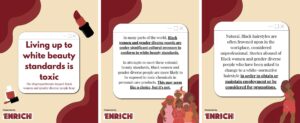
The project employs a collaborative, multi-disciplinary, and community-based approach to addressing environmental racism and climate justice. This looks like community-based research that values mutual respect – researchers and communities working in partnership, as well as advocacy work that provides data to support community members’ advocacy and mobilizing efforts. They also work to spread education and awareness through online communities. Their most recent social media campaign, The Environmental Injustice of Beauty, built awareness among BIPOC youth and others about the diverse health effects of toxic beauty and personal care products, and the role of white/Eurocentric beauty standards in influencing product use.
Dr. Waldron’s research, teaching, and community leadership and advocacy work examine the health and mental health impacts of structural racism and other forms of discrimination in Black, Indigenous, immigrant, and refugee communities. Much of this is reflected in the work the project sets out to do. The ENRICH Project also formed the basis to Dr. Waldron’s first book There’s Something in the Water: Environmental Racism in Indigenous and Black Communities. The book received both the 2020 Society for Socialist Studies Errol Sharpe Book Prize and the 2019 Atlantic Book Award for Scholarly Writing. It was also turned into a Netflix documentary film of the same name by Nova Scotia-born actor Elliot Page and Ian Daniel, who co-directed the film and co-produced it with Waldron.
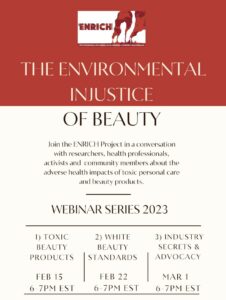 How can you support? The ENRICH Project and partners will be hosting a series of three webinars this month to bring researchers, health professionals, activists and community members together in conversation about the adverse health impacts of toxic personal care and beauty products: you can register through this link!
How can you support? The ENRICH Project and partners will be hosting a series of three webinars this month to bring researchers, health professionals, activists and community members together in conversation about the adverse health impacts of toxic personal care and beauty products: you can register through this link!
The webinars will follow the 2022 social media campaign “The Environmental Injustice of Beauty”. Webinars will be held on the following dates from 6-7pm EST: February 15th, February 22nd and March 1st. These webinars will discuss the cumulative health effects of daily toxic exposures, how colonialism impacts toxic exposures for racialized peoples through white beauty standards, how lax regulations and a lack of transparency from industry contribute to toxic exposures, and how to advocate for change.
You can also support the ENRICH Project’s work by donating and following the project on Instagram, Twitter and Facebook.
